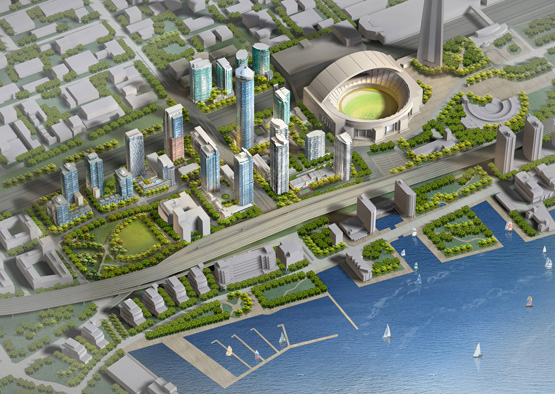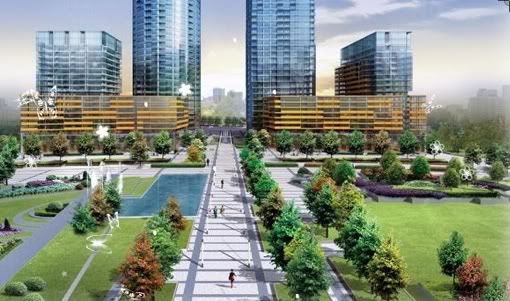CBC News:
Toronto Coun. Doug Ford’s vision of developing a monorail, ferris wheel and mega-mall in Toronto’s Portlands may be closer to reality than a blue-sky concept.
The city’s economic development department has been working on the idea for months and a leading architect and a designer have also been retained.
An architect regarded as one of Toronto’s finest, Mark Sterling was hired by the city-controlled Toronto Portlands Company about two months ago to see if the plan was possible.
via Portlands plan may be closer to reality | CBC News.
Not to speculate too much, but this Port Lands story is going to take an interesting turn next week when the Doug Ford-endorsed plan is finally released with details. Because, despite a week of fun jokes and ridicule, Doug’s plan isn’t going to suck. In fact, it might actually look pretty good.
If private sector developers are good at anything, it’s making pre-construction plans and renders look really good.
For example, here’s what developer Concord told us CityPlace would look like:
CityPlace, located just north of the Gardiner on lands around Spadina Avenues, isn’t fully built out yet, but it is widely regarded as an imperfect development. It’s revealed itself to be a development plan driven and defined by profit motive, resulting in tightly-packed residential units squeezed into mostly bland towers. Despite the growing population, street life is still pretty sterile.
CityPlace, and the Central Waterfront developments that came before it, represent the clearest analogues for what Doug Ford has proposed for the Port Lands, though his plan apparently swaps out residential development for high-end mall retail. Those ‘plans’ started with nice renders packed with greenspace and happy-looking people too. That’s why this is so frustrating: we’ve gone down this exact road before and no one was particularly enthralled with the outcome. The eastern waterfront was our glowing opportunity to learn from our mistakes and do something better.
But, sure, let’s sell out on that. It’ll get us a few extra years of low property tax increases.
That’s not a vision; it’s a joke
The Toronto Star’s Royson James:
The key question will be put to the city’s executive committee Tuesday — by Paul Bedford, the city’s former chief planner who conceived the waterfront vision and defended it before the Ontario Municipal Board in 1999 when Home Depot wanted to locate there.
The developer-friendly OMB agreed with Bedford, city council and waterfront advocates that a big box retail store was not appropriate for the Port Lands; that suburbia on the waterfront was a non-starter; that retail with large parking lots was not an appropriate use.
“I am totally mystified by this,†Bedford says of Ford’s plan. “Ten years later and it’s ‘Never mind a big box, you’ll have a West Edmonton Mall by the lake.’ Where are the values of city building? They don’t get the concept. The last thing we need is a mall surround by asphalt. That’s not a vision; it’s a joke.â€
via Ford’s developer friends are all smiles | Toronto Star.
Bedford sums things up pretty well. Also expressing concern — to put it mildly — over this week’s turn of events is the quickly-formed activist group CodeBlueTOÂ and the John Tory-led Greater Toronto CivicActon Alliance, though I wish the latter was a bit more intentional and forceful with their words.
Following the money
I’ve had a couple of people point me to some research done in May by a YorkU professor who says that the Hearn Generating Station in the Port Lands is controlled by an influential Vaughan developer, who donated a significant amount of money to help pay down Rob Ford’s campaign debts.
Is there a possible link between this developer, Mario Cortellucci, and Doug Ford’s enthusiasm for Port Lands development? Maybe, but I’d discount any thought of corrupt dealings or backroom deals designed to funnel money toward campaign supporters. The Fords just aren’t the type, and I sincerely believe that their motivation these days is almost purely budgetary. Rob and Doug have never expressed much of an appetite for engaging in city building, instead limiting their priorities to maintaining and enhancing a low-tax environment.
This situation almost surely came up as part of a frantic search for workable strategies that would fulfill the mayor’s campaign promise to eliminate the Land Transfer Tax within this council term. The only realistic way to do that is to sell off valuable assets, pay down some of the city’s capital debt, and thus reduce the debt charges that are part of every operating budget.
Doug Ford is a decent enough showman, but even he can’t hide the fact that, to him, the Port Lands represent nothing more than big, flashing dollar signs.


